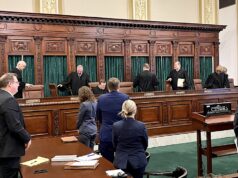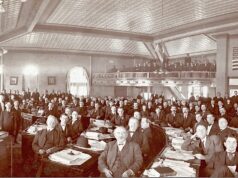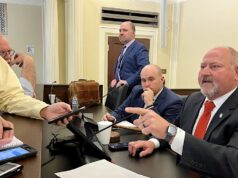

When Alex Scott launched a winning bid for the Norman City Council in 2018, she said she was not running against the incumbent so much as she was running for her community.
But this year, she’s running to beat Sen. Rob Standridge (R-Norman) in SD 15.
“I am largely running for State Senate District 15 because we deserve so much better,” said Scott, a Democrat.
Both Scott and Standridge maintain deeply divided stances on some of the most pressing issues facing the Norman community, especially policing.
Standridge, who has been a state senator since 2012, said he hopes voters in the Republican-leaning district will view his successes in the Oklahoma Legislature as a promise that he can protect their interests.
Police budgets hang in the balance
This summer, Scott proposed a $4.5 million cut to the Norman Police Department budget during a meeting of the Norman City Council. The move — and a subsequent successful vote to lower an expected increase to the NPD budget — was poorly received by a large segment of her community.
But Scott said she was not thinking of the political consequences the idea would have for her. Instead, she felt the city should examine the police budget while the city was still reeling from the pandemic-related economic downturn.
“In the last fiscal year, the police budget was 27 percent of our total general fund,” Scott said. “This year, we have a whole pandemic happen, and then we have, obviously, from that a reduction in sales tax revenue. So what do we do? We cut.”
According to an announcement from the City of Norman following the council’s successful vote to redirect $865,000 away from an expected police budget increase, the money will be put into community outreach efforts.
Though the Norman Police budget is $100,000 higher this year than last fiscal year despite this reduction, the City Council’s decision outraged a segment of Norman’s population. Unite Norman, a group that came together largely in response to the vote, gathered enough signatures to force a recall election for Councilwoman Alison Petrone, and almost enough signatures to do the same for Norman Mayor Breea Clark.
Scott’s term as a councilmember ended shortly after the controversial vote, so she was not eligible to be recalled.
Standridge volunteered with Unite Norman.
While the State Senate majority whip said he held no personal grudges against members of the Norman City Council, he did not think his constituents would support defunding the police.
“Police department funding has become quite political,” he said, “which I don’t think it should be.”
In September, Standridge proposed new legislation that he said would keep police budgets from depending on “the whims of politics.”
The bill, should it be passed, would require popular consensus for future police budget changes in most instances. City governments that went behind citizens’ backs and lowered police budgets would be ineligible to receive certain aid or grants. However, Standridge explained that he would want local governments to still be able to implement rapid changes in the case of an emergency (such as sudden economic downturn).
SD 15 in the news cycle

Standridge also has plans to strengthen Oklahoma’s anti-riot legislation.
In a press release from September, the state senator expressed that while he believed Oklahoma’s anti-riot legislation was good, it could be better. Particularly, he sees a need to ensure financial responsibility for people who damage property during a riot.
Since the killing of George Floyd in Minneapolis this May, there has been a national movement calling for a cultural reckoning on racial injustice. In a few cities, demonstrations have escalated into riots.
Standridge cited examples of the vandalism of Oklahoma businesses in his press release. One Oklahoma City nonprofit headquarters burned in late May.
Though Oklahoma has not seen as much property damage resulting from demonstrations as many other states, Standridge said he feels it is important to be proactive.
“The First Amendment, of course, we certainly favor that,” he said. “But when you cross the line and start destroying people and people’s lives (…) that’s not what those protests are supposed to be about.”
In June, Alex Scott was arrested for climbing a flagpole during a protest outside of a rally for President Donald Trump in Tulsa.
Scott said she was not allowed to share many details about the incident for legal reasons. However, her arrest report was circulated online, including by the social media accounts of at least two Norman police officers.
The NPD officers, John Barbour and Michael Lauderback, were placed under review for sharing Scott’s personal information, including the location and appearance of her home, via those accounts.
On June 27, NPD responded to a reported sexual assault. Scott said in a since-deleted Facebook post that same day, with permission of the victim, that the victim was her neighbor.
In the days that followed, Norman Citizens for Racial Justice called for an outside investigation of the two officers who shared Scott’s address, believing that Scott’s life might be in danger.
The department complied and brought in the Oklahoma State Bureau of Investigation to help.
“I always feel a tremendous amount of guilt talking about it,” Scott said of her neighbor’s assault. “On different (social media) pages for like two weeks — basically from when we defunded the police and then after I got arrested — they were sharing my address and rumors about me. And then that following Friday, my neighbor was attacked.”
On Sept. 22, Scott found what she believed to be severed duck heads and feet scattered through her yard. The parts ended up being from chickens.
She expressed in a Facebook post that morning that she believed the incident was intended as an intimidation tactic. Scott is a vegetarian.
These events, Scott said, strengthened her convictions in the need for policing and criminal justice reform.
Oklahoma’s tax system concerns both candidates
Scott’s plan to implement such reforms includes an overhaul of Oklahoma’s tax system.
Before she ran for office, Scott said she had to wait tables to earn enough money to support herself as a public school teacher. She believes this was because of a misappropriation of tax dollars.
As a state senator, Scott said she would work to redirect where tax money is spent and to ensure appropriate amounts go to public services — including education, environmental conservation and health care.
Scott said she also believes reform could make Oklahoma’s tax system more equitable.
“People are always like, ‘How are you going to pay for this?'” she said. “One of the big things I’ve been talking about lately, because of the pandemic actually, is a billionaire tax.
“Once they knew more about our tax structure and how we are the ninth-most-regressive state in the nation for taxation, which means that we disproportionately and intentionally tax poor folks, people actually support income tax reform.”
Standridge also sees problems in Oklahoma’s taxation structure, though he opposes higher taxes.
He said his time in office has taught him that one of the best ways to bring more funding to state programs is to ensure that Oklahoma tax dollars are not benefitting out-of-state interests.
“Sadly, we do that all the time, by the billions of dollars,” he said. “If I can do one thing over my next four years, it will be to somehow bring more awareness to that and reverse that.”
More and more, the state senator says, young people are having to leave Oklahoma to pursue their interests.
Standridge, who is a pharmacist, says pharmacy is one of the areas where this issue can be most clearly seen.
“I feel for the young people who spend eight or 10 years in pharmacy school and then come out and have their jobs being done by robots in New Jersey,” he said. “I think first and foremost, we should focus on keeping jobs and money in Oklahoma.”
Over his eight years in office, Standridge has faced criticism for his involvement in running pharmacy bills, a potential conflict of interest given his profession. He owns three pharmacy-related businesses with his wife, Lisa.
While Standridge said he understands where the criticism is coming from, he is “at the tail end of [his] career.” Standridge said by using his expertise, he is able to help Oklahoma’s next generation of pharmacists.




















